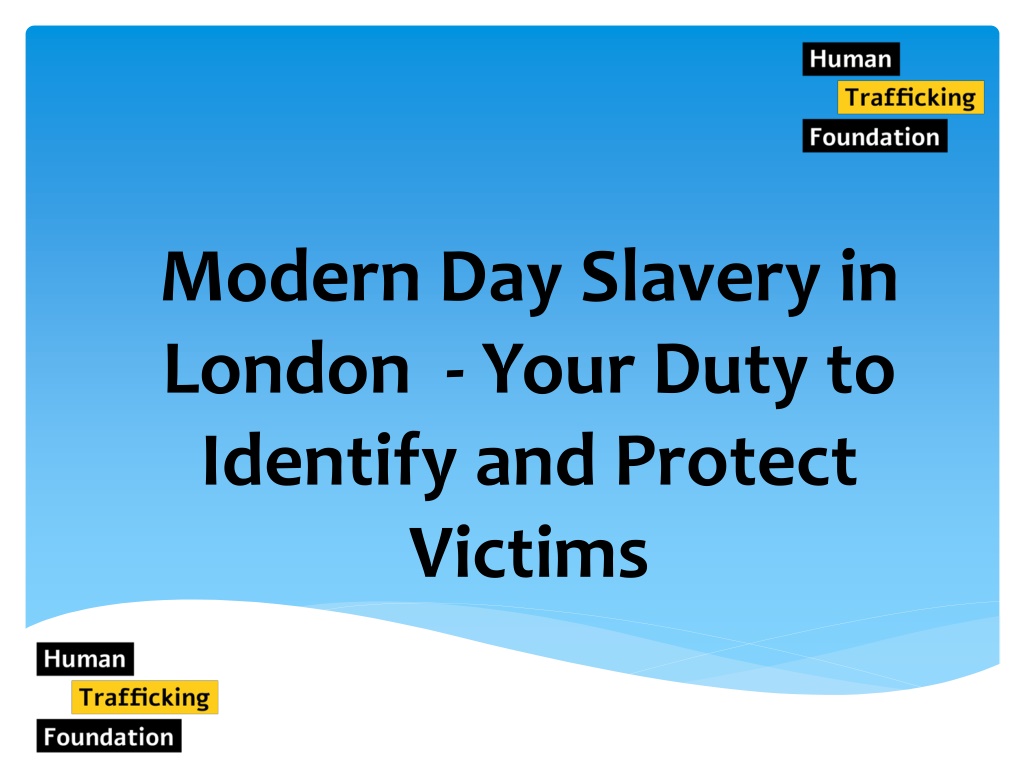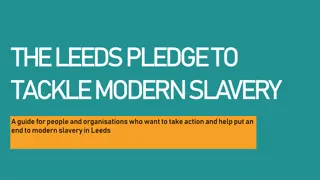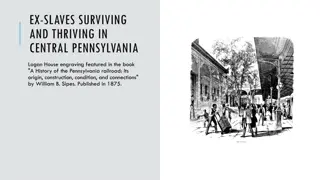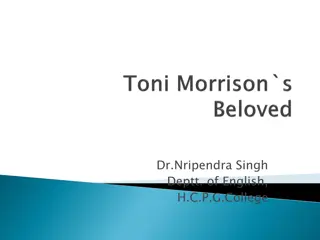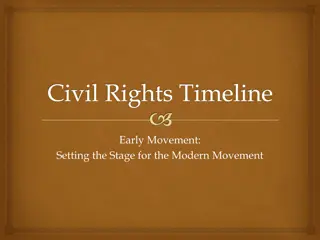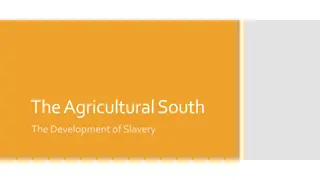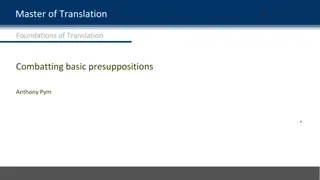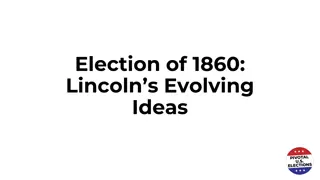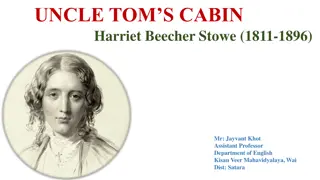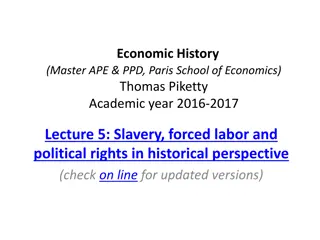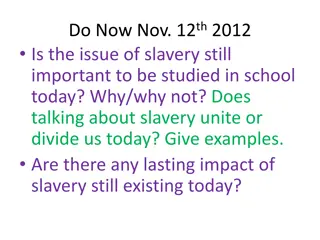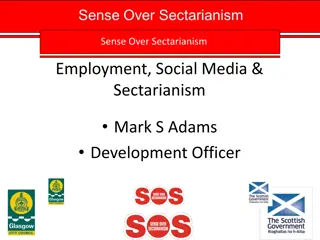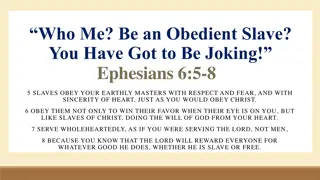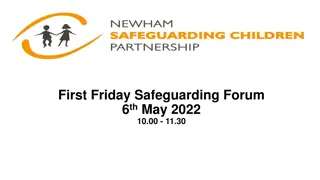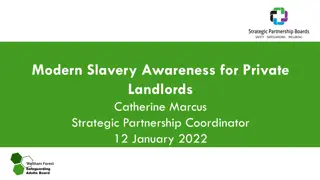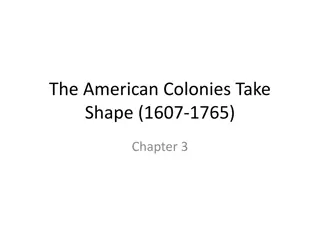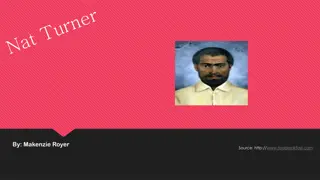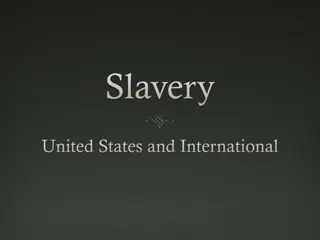Understanding and Combatting Modern Slavery in London
Modern slavery, including human trafficking, servitude, and forced labor, is a harsh reality. The Human Trafficking Foundation in London plays a crucial role in raising awareness and providing support to combat this issue. It's vital to identify victims and offer protection to those who are coerced into exploitation, regardless of consent. Additionally, it's important to differentiate between human trafficking and human smuggling to effectively address these crimes.
Download Presentation

Please find below an Image/Link to download the presentation.
The content on the website is provided AS IS for your information and personal use only. It may not be sold, licensed, or shared on other websites without obtaining consent from the author. Download presentation by click this link. If you encounter any issues during the download, it is possible that the publisher has removed the file from their server.
E N D
Presentation Transcript
Modern Day Slavery in London - Your Duty to Identify and Protect Victims
The Human Trafficking Foundation The Human Trafficking Foundation is the secretariat for the APPG on human trafficking. We also lead a national Human Trafficking Forum, which convenes in London, with 500 members, including NGOs, police and local authorities. We meet quarterly with approximately 90 stakeholders in attendance at each event. Our Chair, Anthony Steen CBE, was formerly the Home Secretary s Special Envoy on Human Trafficking during the passage of the Modern Slavery Bill. Our Trustees include Vernon Coaker MP, Helen Grant MP and Baroness Butler Sloss. The Foundation has worked closely with statutory authorities for several years and understands the challenges local authorities face We have also set up a London Working Group with 100 members, including NGOs, NHS, the Met Police s SCO7 anti-trafficking unit, UKBA and expert lawyers.
What is Modern Slavery? Modern Slavery: encompasses slavery, human trafficking, servitude, forced or compulsory labour. Traffickers and slave masters use whatever means they have at their disposal to coerce, deceive and force individuals into a life of abuse, servitude and inhumane treatment The UN defined human trafficking in the Palermo Protocol as the recruitment, transportation, transfer, harbouring or receipt of persons by means of threat, or use of force, coercion or deception to achieve the consent of a person having control over another person, for the purpose of exploitation (UN, 2000, Art. 3). According to this definition, trafficking includes sexual exploitation, forced and bonded labour, domestic servitude, any form of slavery and removal of organs. Child - anyone under the age of 18 (UNCRC)
Additional notes Consent is irrelevant to exploitation The Home Office circular guidance states that: An individual s consent to the conduct alleged to amount to slavery, servitude or forced or compulsory labour does not prevent the offence being committed. As confirmed by the Palermo Protocol, the consent of a person to any intended exploitation is irrelevant where any of the means set out within the protocol have been used S.1(5) and s.2(2) MSA 2015 Purpose over exploitation The Home Office frontline staff guidance states that: Under the Convention, a person is a victim even if they haven t been exploited yet, for example because a police raid takes place before the exploitation happens So, it is the purpose which is key, rather than whether or not exploitation has actually occurred.
Additional notes Smuggling is not trafficking Frontline staff must avoid confusing human trafficking with human smuggling. In smuggling cases, asylum seekers and immigrants pay people to help them enter the country irregularly. This is a crime against the state rather than a crime against an individual. Smugglers are providing an (illegal) service rather than treating a person as a commodity. It is also short-term rather long-term with a one-off payment rather than ongoing appropriation. The crime of slavery or trafficking overrides any irregular immigration or other minor offences Karen Bradley, former Minister with the Slavery Portfolio: The intent of the offence of illegal working is clear; it is not aimed at the victims of modern slavery. Anyone who is a victim of modern slavery can at any time report their captors https://iasservices.org.uk/governments-immigration-bill-criticised-by-anti-slavery- campaigners/
What types of exploitation exist? Sexual exploitation Domestic servitude Labour exploitation Enforced criminality Forced Benefit fraud Forced marriage /sham marriage Baby trafficking Organs harvesting Cross overs with CSE, DV, multiple occupancy, county lines, planning breaches, health and safety, benefit fraud, homelessness, county lines
NRM and Modern Slavery Act useful toolbox The creation of a new statutory defence for slavery or trafficking victims compelled to commit criminal offences The provision of child trafficking advocates The introduction of two new civil orders to enable the courts to place restrictions on those convicted of modern slavery offences, or those involved in such offences but not yet convicted The provision of mechanisms for seizing traffickers assets and channelling some of that money towards victims for compensation payments Legal aid access Life sentences for traffickers Support/housing under the NRM as an adult
Problem 1 Identification: There is considerable evidence that London is a hub for human trafficking and slavery in the UK and yet many staff in statutory authorities, from social workers to housing officers, struggle to identify many cases, even though there is now a statutory duty to notify the Home Office about potential victims. Barely any staff in local authorities refer victims of trafficking into the Government s National Referral Mechanism. Yet local authorities do not have to be able to recognise if someone is trafficked, just recognise possible indicators of human trafficking .
NCA Data Not always what you expect All victims are migrants... All victims are women The 3,805 victims rescued by our authorities arrived from 108 countries. But In 2016 the third largest victim group came from the UK O f the 3,805 victims found last year, 51% female and 49% male. 15% of victims were referred for domestic servitude; and there are now more victims were exploited for labour trafficked than those who had been trafficked for sex. All victims are hidden... One leading anti-trafficking NGO told me you could find girls who had run away from home being exploited in areas of London, and gave an example of a specific park where this took place. Shadow City
Issues with disclosure Threats No long term options Chose exploitation and sending a little money home above earning nothing Don t understand what NRM is for Fear of authorities Language Concept of slavery Taboo Mental health issues Fear- of traffickers and of authorities Focus on immediate needs- food shelter
What do I do? What to know Emergency: In an emergency call police on 999 Advice: If you are uncertain, call the Modern Slavery Helpline 0800 0121700 Frontline safeguarding staff are expected to: Be able to identify a victim of trafficking or slavery Know that If the person has trafficking indicators they need to either refer them into the NRM, or fill out an MS1 form (+safeguarding duties). Note the threshold to suspect is LOW. Know that victims of slavery rarely self-identify as victims of trafficking/slavery or easily reveal their experiences. Recognition of the crime by the victim is not required. Any child that you suspect is a victim of human trafficking or modern slavery should be referred into the NRM. Note the threshold to suspect is LOW. You do not require the consent of the child or parent to refer a child into the NRM Know how to complete a referral form into the NRM Know that statutory protection and safeguarding responses should also be applied.
Approach Communication explaining what is happening, that they are safe, monitor own language, manage expectation, give timescales and work at their pace Assessment and Planning- Multiagency risk assessment and safety planning. Consider risks post 18; review assessment as risks etc. will change Approach - Agency give them choices, relationship building, what you can offer, give tools for future risk, and education around exploitation, Trauma informed/contextual; Prioritise vulnerability over criminality Safe and appropriate accommodation and environment - Trained foster carers, Create support network and new circles Risk - Understand risk and triggers; Understanding high risk of going missing within 72hrs; Balancing risks and rights (avoid repeating traffickers behavior, timecales, technology ) Intel gathering Make sure you are sharing information with stakeholders and gathering info: - who, what, where, when and how Missing episodes - treat missing as high risk, return interview, risk assessment, info
Problem 2 Lack of support when exiting Government safe houses : After adult victims of trafficking finish receiving the Government provided statutory 45 days of care, there is very little or often nothing in place in local authorities to provide any specialist support for victims of trafficking, even when they have recourse to public funds, and so many get lost in a tragic and repetitive cycle of exploitation.
R (AK) v Bristol City Council3 CO/1574/2015 The claimant was a victim of trafficking. As a non-working EEA national awaiting a leave to remain decision, she was not eligible for housing or welfare support and could provide for her most basic needs only by engaging in prostitution. She claimed that her situation was inhuman, degrading and contrary to the UK s duties under Directive 2011/36/ EU (Anti-Trafficking Directive) art 11 and Council of Europe Convention on Action against Trafficking in Human Beings art 12, as well as ECHR art 3 or art 4. She applied to the council for accommodation. They refused to provide her with accommodation or with subsistence level financial support. In April 2015, on a claim for judicial review, she was granted an interim injunction requiring the council to pay her 50 a week and accommodate her pending trial. On the eve of that trial, the council accepted that, until the claimant could find her own accommodation, it was responsible for providing her with support and assistance.
What next? Setting up a task and finish group on slavery with representatives from children's and adults services and safeguarding teams, housing, licensing, custody, health etc. Map what is taking place in your borough Develop a local referral pathway and protocol for staff working with potentially trafficked young people Ensure all frontline staff are trained so they know all the indicators of human trafficking, know best practice and have a trauma-informed approach understanding survivors rights and entitlements and how to fill in the NRM form Create Champions/Single points of contact Is there a way to record this crime in your systems? Is this crime flagged up in your MASH and MARAC systems? Can you add trafficking as an agenda item to other sub-groups/meetings such as MASE and Missing teams? Need to map local specialist services available to potential victims
Key contacts Key contacts Modern Slavery Helpline 08000121 700 Gangmasters and Labour Abuse Authority (labour trafficking advice and assistance) (GLAA) 0800 432 0804 Intelligence@gla.gsi.gov.uk National Crime Agency NCA (advice) 0844 778 2406 shpresaprogramme@yahoo.co.uk 020 7511 1586 The Salvation Army Human Trafficking Foundation 020 7288 7668 Email: miclu@islingtonlaw.org.uk Hestia s Phoenix Project (male/female) Phone: 0207 636 8505 (Monday to Friday 10am to 5pm) Email mcp@coramclc.org.uk International Organization for Migration (IOM) Phone: 0207 636 8505 (Monday to Friday 10am to 5pm) Email mcp@coramclc.org.uk RASASC (Rape & Sexual Abuse Support Centre) outreach@rasasc.org.uk 0208 683 3311 info@h4w.co.uk 020 7501 6120 Housing For Women http://hfw.org.uk/ NIA (women) 020 7683 1270 0207 683 1210 : rapecrisis@niaendingviolence.org.uk
Key contacts Key contacts Caritas Bakhita House (housing/support for women) karenanstiss@rcdow.org.uk bakhitahouse@rcdow.org.uk Ella's Home (housing/support for women) ellas-home@kahaila.com St John of God Hospitaller Services (housing for men, high needs etc..) 020 7380 6020 MiguelNeves@sjog.org.uk shpresaprogramme@yahoo.co.uk 020 7511 1586 Shpresa (Albanian NGO) Kalayaan (domestic servitude) 020 7288 7668 Email: miclu@islingtonlaw.org.uk Aire (legal EU ) +44(0)207 831 4276 caseworker1@airecentre.org 020 7704 2261 AFRUCA Vietnamese Mental Health Services (men, women) 0207 346 1134 ATLEU (legal) 0800 107 7057 RAMFEL EERC (Eastern Europeans) 0800 043 4303 020 8741 1288
CONTACT DETAILS Tamara Barnett Tamara@humantraffickingfoundation.org 020 3773 2040 http://www.humantraffickingfoundation.org/
